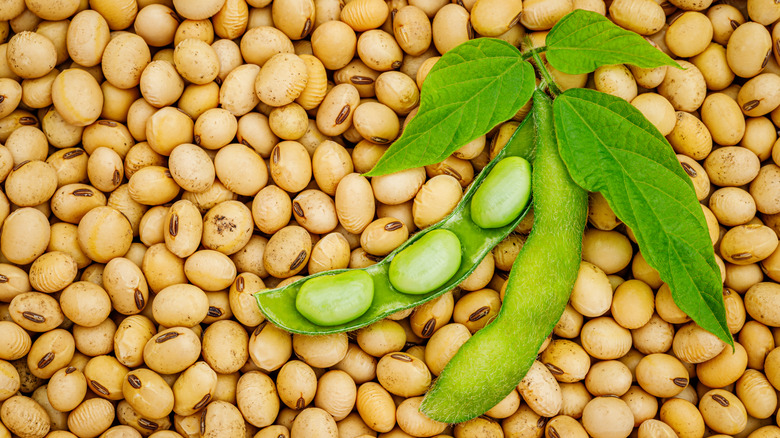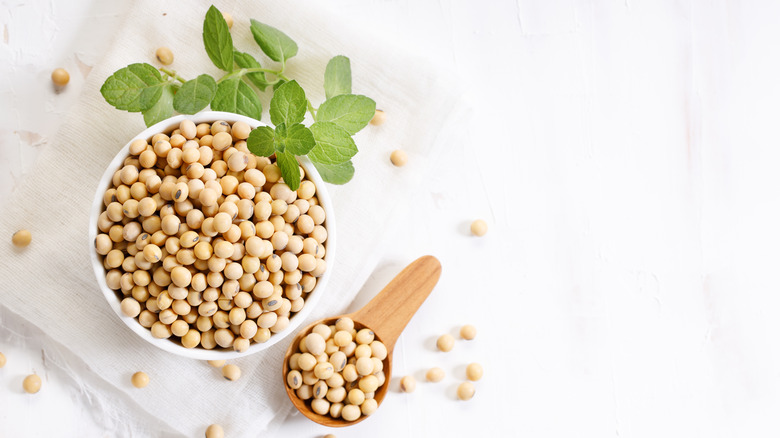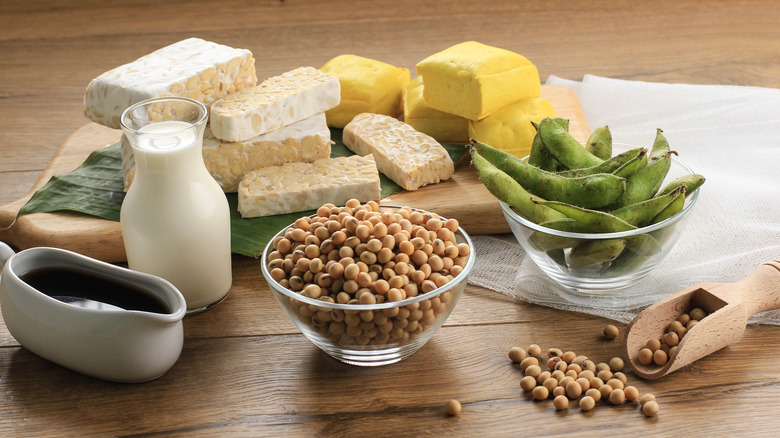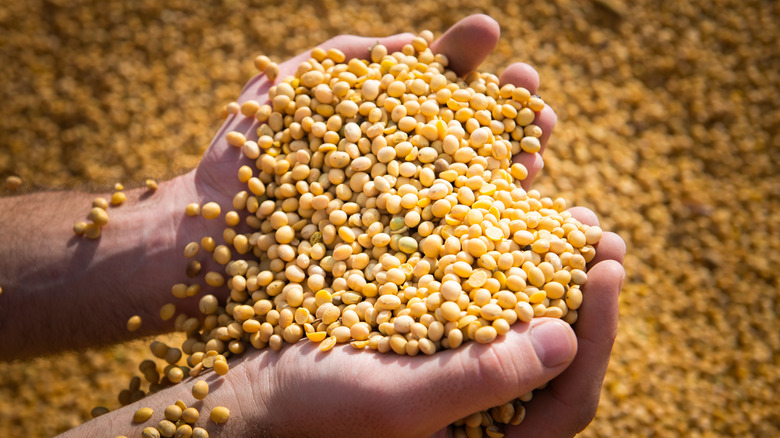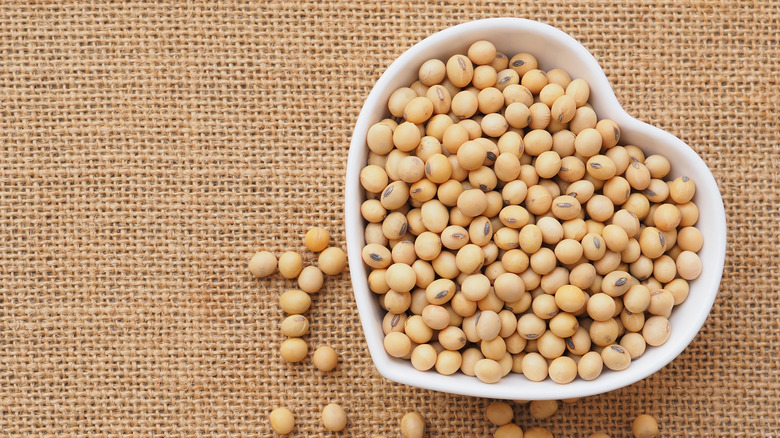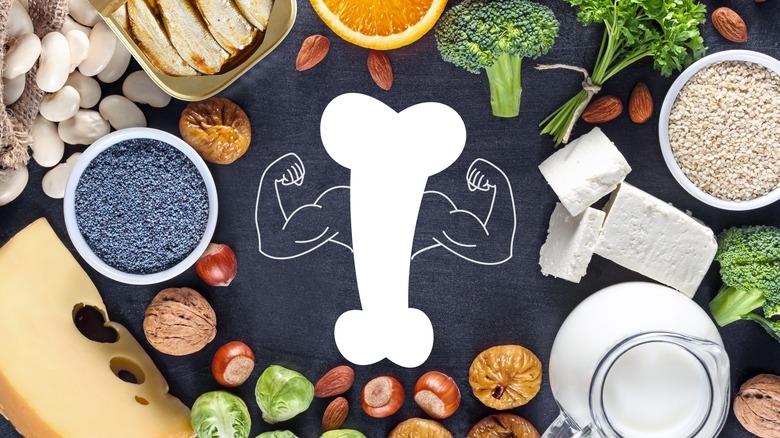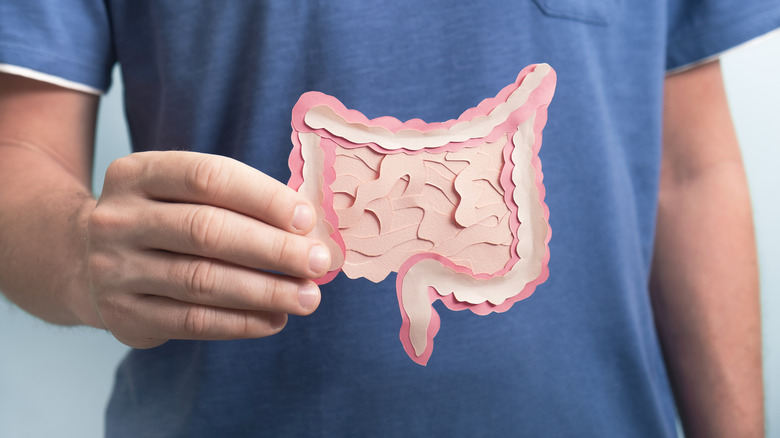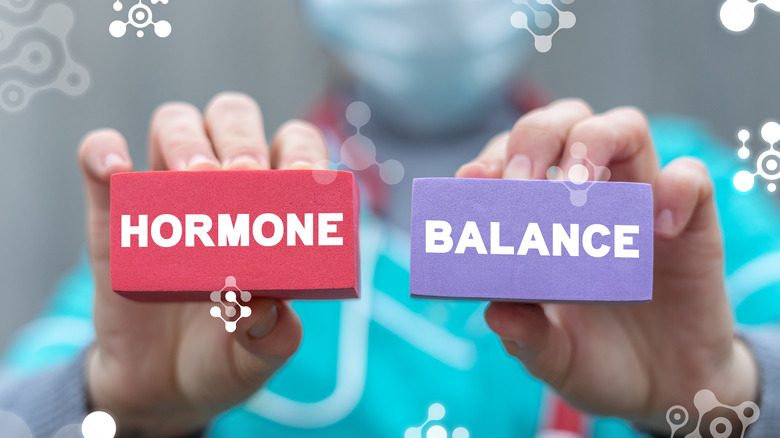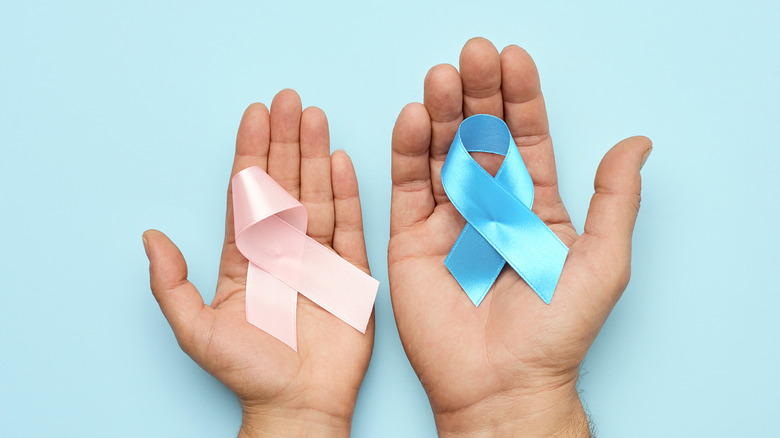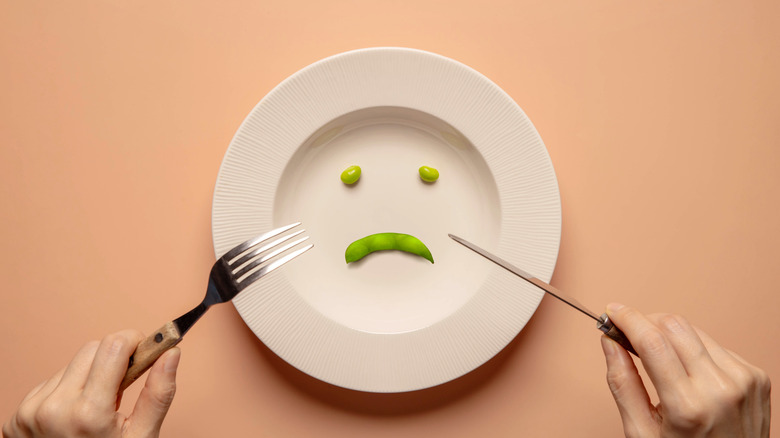What Happens To Your Body When You Eat Soy Every Day
No plant-based food has divided the world quite like the humble soybean, with just as many articles warning against it as there are singing its praises. So, what's the deal – is soy the plant-based BFF you never knew you needed or a hormone-disrupting menace you should you avoid like the plague?
Before we break down the science so you can decide where you stand, let's take a little side trip into our metaphorical history books. Britannica explains that soybeans (also called soya beans or soja beans) are the edible seeds of a leguminous plant that belong to the same family as peas. They've been cultivated in China, Japan, and Korea for thousands of years and continue to be a valuable, affordable source of protein for millions of people around the world.
Soybeans are incredibly versatile and can be enjoyed in a variety of ways, from turning them into tofu, tempeh, and miso to eating them whole as edamame (a fancy name for soybeans picked before they mature) and roasting them to crunchy perfection as soy nuts. They can also be turned into dairy-free milk alternatives, soy sauce, plant-based burgers, protein powder, soy flour, the list goes on. With so many ways to eat it, it's no wonder you might be asking yourself what happens to your body if soy is part of your day-to-day diet — so let's take a look at the research (and remember, regardless of how good a food is for you, moderation and a varied, well-rounded diet is best!).
You get a complete plant-based protein
Let's start with one of soy's greatest accomplishments — its amino acid profile. Not all protein sources are created equal and, when it comes to plant-based sources specifically, soy is one of the highest-quality options around. That's because it's what the science community dubs a "complete" protein, which means it contains all nine of the essential amino acids we need to survive, according to "Functional and Speciality Beverage Technology" (via ScienceDirect).
As explained by the Cleveland Clinic, amino acids are the "building blocks" we use to make protein and while our bodies can make some of those amino acids on their own, there are nine that they can't. So, we have to get them from the food that we eat — hence the name, "essential."
All animal proteins are complete proteins, but few plants can say the same. Soy is perhaps the most well-known, but quinoa and hemp seeds are complete proteins, too (via Well+Good). As is pea protein, although it's low in the essential amino acid methionine, according to Healthline. That's why some protein powders and bars will mix pea protein with other plant-based proteins that are richer sources of methionine, like rice protein, to complete the protein package (no pun intended). But we don't need to get all nine amino acids together at every single meal. As long as we get them all at some point throughout the day, our bodies can use them to make the protein we need.
You'll consume a variety of essential vitamins and minerals
Soy doesn't just provide protein. It's also rich in several important vitamins and minerals including vitamin B6, zinc, iron, and magnesium (via U.S. Department of Agriculture). Consuming soybeans is a great way to get potassium as well. "The potassium content is notable because intake of this mineral is often suboptimal," the authors of a 2016 study in Nutrients wrote.
According to the Cleveland Clinic, many soy foods are also enriched with calcium, vitamin D, and vitamin B12 — all nutrients that can be difficult to get enough of in vegetarian diets. This is a good thing because calcium, vitamin D, and potassium are considered "nutrients of public health concern" (along with fiber) as noted in a 2018 study published in Nutrients. So many of us, vegetarians and non-vegetarians, don't get enough. That makes soy an easy, nutrient-rich way to enhance overall diet quality and get more of the vitamins and minerals we need (via Cleveland Clinic).
Your fiber consumption may increase
If you think fiber is boring and unimportant, think again. While it might not be thought of as the "sexiest" nutrient (that award probably goes to protein), it's vital to overall health and has been linked to a variety of benefits from promoting heart health to lowering the risk of diabetes and certain types of cancer (via Cleveland Clinic). Nevertheless, about nine out of 10 of us aren't getting enough, according to the American Society for Nutrition. Yes, a whopping 93% of adults aren't getting enough fiber in their diet. On the flip side, the Mayo Clinic Health System says most Americans consume twice as much protein as they need. It sounds like fiber is getting the short end of the stick.
Luckily, it's easy to up your fiber intake by eating more whole, fiber-rich foods — one of which is soy. Not only does the U.S. Department of Agriculture list a cup of soybeans as having 17 grams of fiber (60% of what you need in a day based on the daily value), it also gives you both types of fiber, insoluble and soluble, as explained by Healthline.
Insoluble fiber promotes bowel regularity (another way of saying it can keep you from getting constipated), while soluble fiber becomes fuel for the "good" bacteria in your gut, also known as your gut microbiome. Research suggests a healthy microbiome is linked to a lower risk of diabetes, less inflammation, and a variety of other benefits, and it's never too late to start improving it. In fact, a 2021 study found just two weeks of a higher fiber diet was enough to see changes (via Medical News Today).
Your heart will see some benefits
Research suggests that soy intake can promote heart health, which led the Food and Drug Administration (FDA) to approve a heart-healthy claim for the packaging and advertising materials of soy-based foods in 1999 (via the Journal of the American Heart Association). Studies on soy and heart health continue today, with more recent research suggesting a benefit, as well.
The American Heart Association summarized a study published in 2020, for example, that found people who ate at least one serving of tofu a week (as opposed to rarely eating it at all) had an 18% lower risk of heart disease, while another study published in 2022 found consuming around a third of a cup of soybeans every day for 16 weeks improved participants' blood pressure and LDL (aka "bad") cholesterol levels.
As is the case with many bodies of food-based research, though, some studies around soy and heart health have found inconclusive or inconsistent results. Because of this, the FDA actually proposed revoking soy's heart health claim in 2017, but an in-depth review of existing research published in the Journal of the American Heart Association in response continued to support its benefits. That said, the authors noted that more research is needed to confirm whether this is due to the replacement of animal proteins with a plant-based protein or something unique to soy itself.
Your bone health could improve
Soy's potential benefits for bone health are particularly relevant for women, as there's a close relationship between estrogen and bone mass. Everyday Health explains that our bodies are constantly breaking down and rebuilding bone to keep them healthy and strong, and estrogen helps keep that process running efficiently. That's a big reason mass tends to decline more rapidly after menopause — the drastic drop in estrogen leaves bones unable to rebuild as fast as they're breaking down, as Kelsey Mangano, assistant professor of nutrition at the University of Massachusetts, told the publication.
Soy contains plant estrogens called isoflavones, and while they are different and significantly weaker than human estrogen, they can bind to the same receptors in the body (via Harvard T.H. Chan School of Public Health). That means, in theory, they could offer some of the same protective benefits for bone health. Some studies seem to support this, linking women's soy intake to a lower risk of fractures and bones that are better able to retain calcium; however, others have found no significant benefit. So, the jury is still out. Nevertheless, the lead researcher of one such study, Dr. Alekel of Iowa State University, told Everyday Health that this doesn't mean she sees a downside to consuming soy-based foods, and in fact believes them to be "a good, sensible choice if you want to minimize your intake of fat, particularly saturated fat, and yet try to maximize your intake of high-quality protein."
Your body may be better able to fight free radicals
Soy also provides a variety of antioxidants, compounds that help our bodies fight free radicals. As shared by Harvard Medical School, free radicals are molecules that our bodies produce when exposed to things like air pollution, alcohol, radiation, tobacco smoke, and even exercise. While they're unavoidable, too many are linked to a variety of health conditions from diabetes and heart disease to cancer. The good news is that antioxidants can neutralize free radicals so they don't cause harm, and antioxidants are found in all plant foods, soy included (though the major sources are fruits and vegetables).
A review of research in the journal Antioxidants around the antioxidants in soy specifically (like those isoflavones we mentioned, along with other compounds like anthocyanins) notes they're likely to be behind some of its purported benefits, including reducing the risk of type 2 diabetes, heart disease, and some types of cancer, though more research is needed to confirm.
You might have less inflammation
Chronic low levels of inflammation throughout the body have been implicated in a whole host of health conditions, from heart disease and diabetes to cancer and digestive issues, and it can be triggered by a variety of habits and conditions, like smoking, autoimmune disorders, stress, and more (via Cleveland Clinic). Luckily, you can combat chronic inflammation with a diet that includes nutrient-rich foods like fatty fish, leafy greens, berries, avocados, and soy, to name just a few.
Several studies that have looked specifically at soy and inflammation have found positive results. One study published in the Journal of the Academy of Nutrition and Dietetics, for example, examined the diets of around 1,000 Chinese women and found those who ate more soy-based foods liked tofu, fresh soybeans, soy milk, and soy sprouts had lower levels of inflammatory markers in their blood. Another study in the Journal of Medical Investigation found similar correlations between fermented soy products in a group of more than 1,400 Japanese men and women. These benefits were linked to isoflavones.
Fermented soy products may boost your brain health
Fermented soy-based foods specifically, like miso, tempeh, and soy sauce, have been preliminarily linked to slowing age-related declines in brain function and reducing the risk of Alzheimer's disease and Parkinson's disease (via Harvard T.H. Chan School of Public Health). It's worth noting, however, that these have been primarily animal studies, and human studies have been inconclusive thus far.
Fermented foods in general have a long list of health benefits because the "good" bacteria and yeast used to ferment them are considered probiotics — a crucial component of gut health (which emerging research suggests might play a role in the development of chronic diseases like heart disease and diabetes). While these benefits were more recently discovered, fermentation (i.e., the conversion of carbohydrates into alcohol or acids that makes food inhospitable to harmful microorganisms) has been used for thousands of years to keep foods safe without refrigeration, making the health benefits a happy accident.
Your gut microbiome may flourish
"Gut microbiome" is the term used to describe the trillions of bacteria and other microorganisms in our gut, and the more diverse they are, the healthier we seem to be. Whether this benefit is linked to the fiber in soybeans or another component entirely, including soy-based foods in your diet has been found to have beneficial effects on the makeup of our microbiome.
One research review published in the Journal of Agricultural and Food Chemistry found soy promotes shifts in bacterial makeup that have been associated with improved health, for example boosting populations of two types of "good" bacteria, bifidobacteria and lactobacilli. Additionally, a study in Nutrition, Metabolism & Cardiovascular Diseases found soy was associated with a microbiome that could protect against high blood pressure. This last one is just one example of the complex relationships emerging between the bacteria in our gut and our health overall.
Your hormone levels shouldn't go wild
There's a common misconception that you should steer clear of soy-based foods because they can negatively affect your hormone levels and subsequent health, but existing research suggests that isn't likely to be the case. A meta-analysis published in 2021 reviewed the results of 41 clinical studies involving more than 1,750 men and found neither soy nor isoflavone consumption altered testosterone or estrogen levels in a significant way. Plus, the Harvard T.H. Chan School of Public Health notes the potential effect on women's estrogen levels is mild. They also explain that it varies based on original estrogen levels. So, if a woman is premenopausal, for example, it could slightly decrease estrogen levels, whereas if she is postmenopausal, it could slightly increase them (though the emphasis is on the word "slightly").
Interestingly, this hormone controversy centers around isoflavones — the same plant estrogens linked to many of soy's benefits. But lots of nutritious foods have plant estrogens in them (like flaxseeds, peaches, garlic, and nuts according to WedMD), soy just has comparatively higher amounts and its phytoestrogens are the most extensively studied. Research also suggests soy's impact depends on whether you're consuming soy as whole foods like tofu or as isolated protein or isoflavone supplements. Most experts recommend the whole food route.
Kelsey Mangano, professor of nutrition at the University of Massachusetts, told Everyday Health, "I always recommend, based on research, hands down, that people try their best to attain these nutrients through dietary intake [as opposed to supplements] because the research really supports that's when we see the most impact from any type of nutrient or nutrient-nutrient interaction on health outcomes."
If you're post-menopausal, you may have fewer hot flashes
Though the potential effect of soy-based foods on women's estrogen levels is mild, it could help temper some of the side effects many women experience during menopause: hot flashes. Menopausal women have much lower levels of human estrogen circulating throughout their body, so the phytoestrogens in soy might actually offer a little bit of protective estrogenic activity when they bind to estrogen receptors in its place (via WebMD).
In fact, one older study found soy isoflavones decreased hot flashes, mood swings, and sleep disturbances associated with menopause, and Dr. Machelle Seibel, professor of clinical obstetrics and gynecology at the University of Massachusetts Medical School in Worcester, told WebMD, "There is some good data that soy can reduce both the frequency and the intensity of hot flashes by about 50%." That said, there are also studies that find no benefit, so, as with many areas of food science, more research is needed.
Reduced risk of prostate and breast cancers
Despite concerns for the opposite, research suggests soy could decrease the risk of prostate and breast cancer. The Prostate Cancer Foundation notes soy has been found to have either a positive or neutral effect on cancer, and, since it also shows benefits for blood pressure, cholesterol, diabetes, and heart health and can help lower inflammation, they recommend prostate cancer patients incorporate soy into their diet for overall disease risk.
When it comes to breast cancer, studies in women have found those with a diet rich in soy-based foods have a lower risk, especially if it's a lifelong habit (via Mayo Clinic). The Mayo Clinic also points out, however, that soy or isoflavone supplements have much higher levels of plant estrogen than soybeans and other whole soy-based foods and can have the oppositive effect of increasing risk. That's another reason to consider focusing more on foods like edamame, tofu, tempeh, and miso if you're looking for ways to add soy to your diet.
You could realize you're allergic
Despite soy's many benefits, you should definitely avoid it if you're allergic; however, statistically speaking, you're probably not. According to Food Allergy Research & Education, just 0.4% of infants in the United States are allergic to soy, and most outgrow it by adulthood. It is possible, though, so the Mayo Clinic recommends that if you notice symptoms when eating soy, like tingling in the mouth, itching, swelling, wheezing, abdominal pain, diarrhea, nausea, vomiting, or skin redness you let your doctor know. And, if you experience symptoms of a more severe, but much less common, reaction called anaphylaxis, like difficulty breathing, a rapid or weak pulse, dizziness, drooling or inability to swallow, or full-body redness and warmth, seek emergency treatment immediately.
If you do find yourself allergic to soy or choose to avoid it for any other reason, keep an eye out for it in unexpected places. It can be listed on ingredient labels under a variety of names, including textured vegetable protein, monosodium glutamate (MSG), hydrolyzed plant protein, and natural flavoring.

